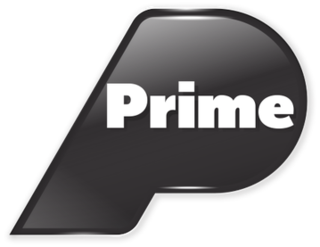Related Research Articles
Television in New Zealand was introduced in 1960 as a state-run service. The broadcasting sector was deregulated in 1989, when the Government allowed competition to the state-owned Television New Zealand (TVNZ). There are currently two forms of broadcast television: a terrestrial (DVB-T) service provided by Freeview; and satellite services provided nationwide by both Freeview and Sky.

Television New Zealand, more commonly referred to as TVNZ, is a television network that is broadcast throughout New Zealand and parts of the Pacific region. All of its currently-operating channels are free-to-air and commercially funded.

Spark New Zealand Limited is a New Zealand telecommunications company providing fixed-line telephone services, a mobile phone network, internet access services, and ICT services to businesses. It was known as Telecom New Zealand until it was rebranded with its current name in 2014. It has operated as a publicly traded company since 1990. Spark is the second-largest wireless carrier in New Zealand, with 2.3 million subscribers as of July 2017.

Sky Network Television Limited, more commonly known as Sky, is a New Zealand broadcasting company that provides pay television services via satellite, media streaming services and broadband internet services. It is also a wholesale channel provider to New Zealand IPTV provider Vodafone. As at 30 June 2021, Sky had 955,168 subscribers consisting of 561,989 satellite subscribers and 393,179 streaming subscribers. Despite the similarity of name, branding and services, such as Sky Go and MySky shared with its European equivalent, Sky, there is no connection between the companies.

Prime is a New Zealand free-to-air television network. It airs a varied mix of programming, largely imported from Australia, the United Kingdom and the United States.

SuperSport is a South Africa-based Pan-Africa group of television channels carried on the DStv & Canal+ satellite platforms as well as GOtv terrestrial platform. It provides sports content in South Africa, Nigeria and many other African countries.

BBC Sport is the sports division of the BBC, providing national sports coverage for BBC television, radio and online. The BBC holds the television and radio UK broadcasting rights to several sports, broadcasting the sport live or alongside flagship analysis programmes such as Match of the Day, Test Match Special, Ski Sunday, Today at Wimbledon and previously Grandstand. Results, analysis and coverage is also added to the BBC Sport website and through the BBC Red Button interactive television service.

Keith Quinn is an author, and one of New Zealand's most experienced television sports commentators.
TVNZ Sport Extra was a temporary sports television station in New Zealand, operated by TVNZ. Broadcasting on channel 20 on Freeview, it showed live and delayed free-to-air coverage of selected events. Eric Kearley, TVNZ's Digital Launch Manager, has stated there was no further plans for this channel until the 2008 Summer Olympics.
Warner Bros. Discovery New Zealand is a division of Warner Bros. Discovery that operates several television channels in New Zealand. It operates five national free-to-air television channels, eight pay-TV channels on Sky and the Newshub service.
In the United Kingdom, sporting events are broadcast on several national television networks, as well as radio.
This article refers to sports broadcasting contracts in New Zealand. For a list of other countries' broadcasting rights, see Sports television broadcast contracts.
Sky Sport is a group of sports-oriented television channels operated by New Zealand's satellite pay-TV company, Sky.
Martin Devlin is a New Zealand radio and television broadcaster. In July 2012, The Radio Network announced that Devlin would take over the morning show for NZ's first private station, Radio Hauraki. Devlin later anchored a show on Newstalk ZB, until 2021.
Anti-siphoning laws in Australia regulate the media companies' access to significant sporting events. In 1992, when the country experienced growth in paid-subscription media, the Parliament of Australia enacted the Broadcasting Services Act 1992 that gave free-to-air broadcasters essentially first refusal to certain sporting event broadcasting rights. The anti-siphoning list is a list of events, the televising of which should, in the opinion of the relevant Minister, be available free to the general public. To effect this 'freedom', the Broadcasting Services Act 1992 includes a licence condition on pay TV providers that prohibits them from acquiring anti-siphoning events unless a national broadcaster or a network of commercial television broadcasters have the right to televise the events. This prohibition drops away a certain period before the event starts. The current anti-siphoning rules also prohibit national television broadcasters and commercial television broadcasters from premiering listed events on digital multi-channels. Listed events may be shown on digital multi-channels if they have already been broadcast, or are simultaneously broadcast on the broadcaster's main channel.

Grant Wallace Nisbett is a New Zealand sports broadcaster and former TAB media liaison. He is the lead rugby commentator for SKY Network Television and called his 300th test match between the All Blacks and France at Westpac Stadium on 16 June 2018. His career spans over 40 plus years.
Tony Johnson is a New Zealand rugby commentator and presenter for SKY Television.

TVNZ Duke is a New Zealand television channel run by state broadcaster Television New Zealand. It screens programming targeted at a male audience. It was launched on 20 March 2016 to replace TVNZ's popup channel that was used to air the Wimbledon Championships. Initially advertised as a male-skewed channel, this branding was later dropped.
This is a timeline of the history of BBC Sport.
References
- ↑ "Spark Sport wins New Zealand Cricket broadcasting rights for six years". Stuff.co.nz . Retrieved 22 May 2020.
- ↑ "Spark Sport wins New Zealand Cricket broadcasting rights for six years". Stuff.co.nz . Retrieved 22 May 2020.